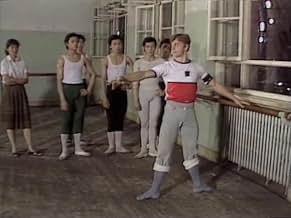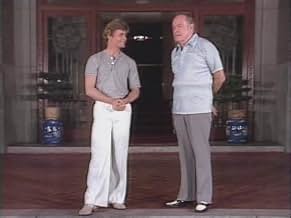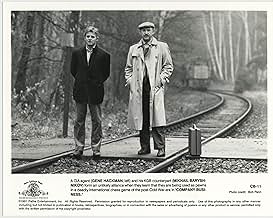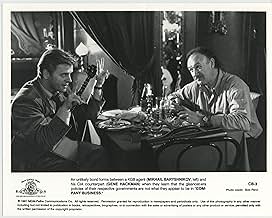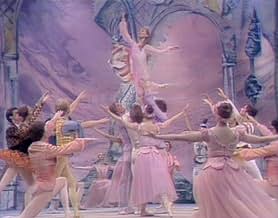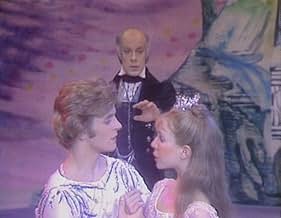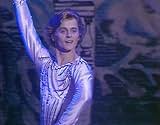Mikhail Baryshnikov(I)
- Actor
- Producer
- Additional Crew
Boyishly cute, diminutive and strong as a bull, but as graceful as any
gazelle or swan, Mikhail Baryshnikov is a household name even to
non-balletomanes. Widely considered to be one of the greatest and
biggest names in dance.
Mikhail began his ballet studies in his native Riga, Latvia. He was accepted by the Leningrad Choreographic School, the associate school of the Kirov Ballet. One of his instructors there was [=nlinkm0701090], who had taught Rudolf Nureyev - who defected in Paris and was already making a name for himself in America. Among Baryshnikov's friends at the school were Alexander Godunov (nicknamed Sasha) and "ballerina assoluta" Natalia Makarova.
Mikhail joined the Kirov Ballet of Leningrad (now St. Petersburg) and his technique and balletic abilities were so great, he skipped the corps and was immediately put in a soloist position. While doing quite well in Russia, even finding an audience fan-base, the government and dance seemed to be too limiting and frustrating for him. Like other Russian dancers before him and after him, he would soon defect.
When the Kirov was touring in Canada, Baryshnikov defected and then quickly became a member of the National Ballet of Canada. Later on, he joined the American Ballet Theatre becoming one of the company's principal dancers. During this time he was reintroduced to 'Gelsey Kirkland' of New York City Ballet, whom he had previously met in Russia, becoming partners both on the stage and in real life. The celebrated partnership went on to become legendary, with their most well-known work being Baryshnikov's version of Tchaikovsky's ballet "The Nutcracker".
In 1977, Mikhail made his film debut in The Turning Point (1977), a part written especially for him, where he played Yuri, a superstar ballet defector from Russia who beds more ballerinas than he dances with. Gelsey was also slated to co-star, but she wanted "no part of Hollywood", had objections to the story-line and soon after the two split. The movie went on to be nominated for 11 Oscars, including one for Mikhail.
Throughout his life Mikhail had idolized George Balanchine, the great choreographer and ballet master of the early 20th century for his innovation within the art of modern ballet. Thus, in addition to his occasional casting in films, Baryshnikov applied to and became a student of the great Balanchine, learning his choreography styles, taking a sabbatical from the ABT. Mikhail danced "Prodigal Son" and numerous other ballets at NYCB under Balanchine's direction and continued with NYCB until he was offered the position of Artistic Director at ABT. He briefly resumed the role of principal dancer, but was forced to quit professional ballet due to injuries. In the 1990's, he co-founded the White Oak Dance Project, and in 2000 received a lifetime of achievement award at the Kennedy Center Honor Awards.
Baryshnikov has been called the greatest male dancer of the 20th century and continues to dance, model and act, both in film and in the theater.
Mikhail began his ballet studies in his native Riga, Latvia. He was accepted by the Leningrad Choreographic School, the associate school of the Kirov Ballet. One of his instructors there was [=nlinkm0701090], who had taught Rudolf Nureyev - who defected in Paris and was already making a name for himself in America. Among Baryshnikov's friends at the school were Alexander Godunov (nicknamed Sasha) and "ballerina assoluta" Natalia Makarova.
Mikhail joined the Kirov Ballet of Leningrad (now St. Petersburg) and his technique and balletic abilities were so great, he skipped the corps and was immediately put in a soloist position. While doing quite well in Russia, even finding an audience fan-base, the government and dance seemed to be too limiting and frustrating for him. Like other Russian dancers before him and after him, he would soon defect.
When the Kirov was touring in Canada, Baryshnikov defected and then quickly became a member of the National Ballet of Canada. Later on, he joined the American Ballet Theatre becoming one of the company's principal dancers. During this time he was reintroduced to 'Gelsey Kirkland' of New York City Ballet, whom he had previously met in Russia, becoming partners both on the stage and in real life. The celebrated partnership went on to become legendary, with their most well-known work being Baryshnikov's version of Tchaikovsky's ballet "The Nutcracker".
In 1977, Mikhail made his film debut in The Turning Point (1977), a part written especially for him, where he played Yuri, a superstar ballet defector from Russia who beds more ballerinas than he dances with. Gelsey was also slated to co-star, but she wanted "no part of Hollywood", had objections to the story-line and soon after the two split. The movie went on to be nominated for 11 Oscars, including one for Mikhail.
Throughout his life Mikhail had idolized George Balanchine, the great choreographer and ballet master of the early 20th century for his innovation within the art of modern ballet. Thus, in addition to his occasional casting in films, Baryshnikov applied to and became a student of the great Balanchine, learning his choreography styles, taking a sabbatical from the ABT. Mikhail danced "Prodigal Son" and numerous other ballets at NYCB under Balanchine's direction and continued with NYCB until he was offered the position of Artistic Director at ABT. He briefly resumed the role of principal dancer, but was forced to quit professional ballet due to injuries. In the 1990's, he co-founded the White Oak Dance Project, and in 2000 received a lifetime of achievement award at the Kennedy Center Honor Awards.
Baryshnikov has been called the greatest male dancer of the 20th century and continues to dance, model and act, both in film and in the theater.


